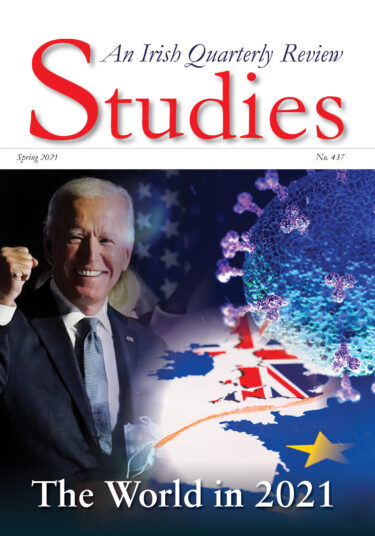Showing all 9 results
IS THIS WHAT HISTORY FEELS LIKE WHEN IT’S BEING MADE?
The above paraphrasing of Kevin O’Rourke’s comment, made in the context of the unfolding process of Brexit in 2018, sets the stage for the Spring 2021 issue of Studies: An Irish Quarterly Review. The massive transformations across social, political, economic and artistic spheres in recent times give the contributors both pause for thought and fodder for reflection.
The potential consequences of events such as Brexit, COVID-19 and the Trump era in the USA have exposed instabilities in prevailing Western perspectives and provoked increases in authoritarian nationalism, xenophobia, individualism and racism across the world.
Kevin O’Rourke takes a broad perspective and considers the impact on the global economy; he suggests a levelling of employment standards and an end to inequality. David Holloway, with a spotlight on post-Trump USA, ponders the fragility of the democratic system even in places where we did not suspect that to be the case. Tomáš Halík considers the emerging links between religious fundamentalism and nationalist, authoritarian, right-wing political movements. Bryan Fanning traces the genesis of Christian democracy in Europe and the birth of the EU. David Ford seeks a wise worldview in the context of Micheal O’Siadhail’s recently-published The Five Quintets. And William Kingston urges innovation in the Irish economic response to the changing terms of globalisation.
Elsewhere Frank Brennan SJ writes about the trial, incarceration, appeal and dismissal of charges against Cardinal George Pell and the marked media hostility surrounding the entire case. And Brendan Walsh considers the contribution of the teaching religious in Ireland between the 1940s and 1970s.
Overall, as divergent viewpoints harden and silos are reinforced by a combination of external circumstance and internal narrative there is a growing recognition, championed by Pope Francis in his recent writings, of the need for an acknowledgment of ‘the other’ and open-minded dialogue within and between countries.

